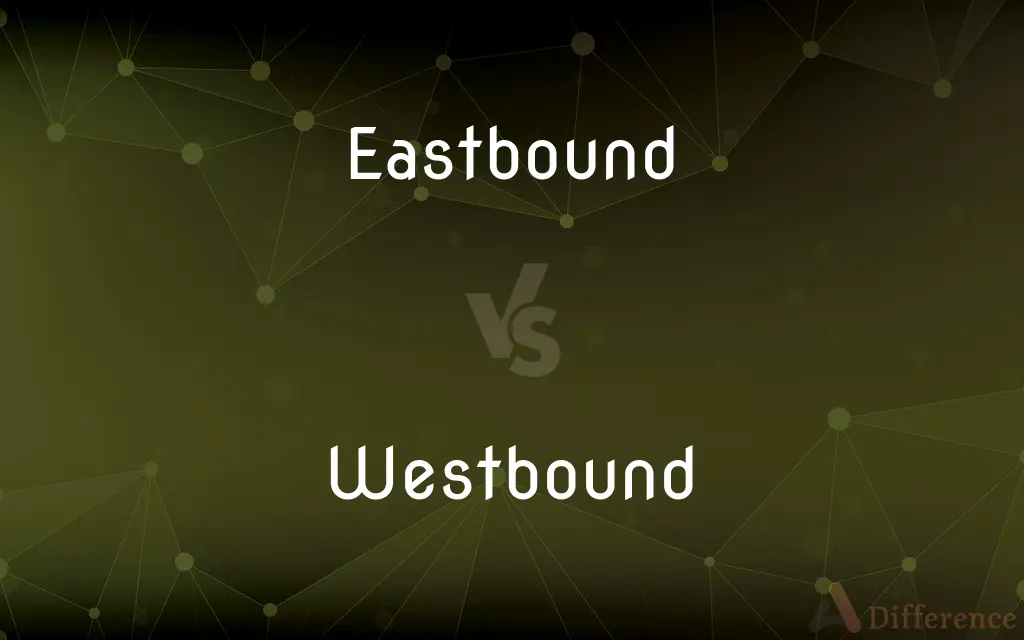Eastbound vs. Westbound — What's the Difference?
Edited by Tayyaba Rehman — By Fiza Rafique — Updated on April 4, 2024
Eastbound means heading toward the east, while westbound refers to moving toward the west.

Difference Between Eastbound and Westbound
Table of Contents
ADVERTISEMENT
Key Differences
Eastbound and westbound are directional terms indicating the general heading or orientation of a movement or route toward the east and west, respectively. These terms are commonly used in transportation, navigation, and geographical descriptions to provide clear guidance or directions. For instance, eastbound traffic refers to vehicles moving in the direction of the east on a road or highway.
While eastbound routes or vehicles are heading toward the east, westbound ones are moving in the opposite direction, toward the west. This distinction is crucial for understanding travel directions, planning trips, and navigating transportation systems, such as roads, railways, and air travel. For example, an eastbound train is one that travels in the direction that would take it closer to the eastern geographic points, whereas a westbound train heads toward western destinations.
The use of eastbound and westbound helps in simplifying navigation and communication, especially in contexts where precise geographical orientation is necessary. For travelers, knowing whether they are on an eastbound or westbound route can significantly affect their travel plans, including the timing of trips, since the direction can influence factors like sun position and, in some cases, wind patterns which might impact travel speed and comfort.
In mapping and navigation, these terms are often paired with northbound and southbound to describe comprehensive directional movement. This becomes particularly useful in cities or regions where roads and transport lines are laid out in a grid pattern, making it easier for residents and visitors to orient themselves and navigate between different points.
Despite their straightforwardness, the application of eastbound and westbound goes beyond mere directionality; it also embeds cultural, historical, and practical nuances. For instance, in historical contexts, westward expansion in the United States had significant implications for development, settlement, and cultural narratives. Thus, these terms do more than denote direction; they convey movement, progress, and sometimes, historical journeys.
ADVERTISEMENT
Comparison Chart
Definition
Heading toward the east
Moving toward the west
Usage
In navigation, transportation, and geographical orientation
In navigation, transportation, and geographical orientation
Orientation
Opposite of westbound
Opposite of eastbound
Contextual Importance
Used for planning travel routes, understanding traffic patterns
Used for planning travel routes, understanding traffic patterns
Symbolism
Can symbolize beginnings or origins in some cultures
Often associated with exploration, expansion, and sometimes sunset
Compare with Definitions
Eastbound
A term used in transportation to indicate direction.
Eastbound flights were delayed due to weather conditions.
Westbound
Moving or directed toward the west.
We caught a westbound bus to get to the city center.
Eastbound
Directed or moving toward the east.
The eastbound train departs at dawn.
Westbound
A term used in transportation to specify direction.
The westbound highway is currently under construction.
Eastbound
In navigation, pertaining to the orientation toward the east.
Keep on the eastbound track until you reach the coast.
Westbound
In navigation, related to the orientation toward the west.
The captain set the ship on a westbound course.
Eastbound
Used to describe the general direction of an action or journey.
Our eastbound journey took us through several states.
Westbound
Pertaining to the side of a road or path leading west.
The westbound lanes are often quieter in the evening.
Eastbound
Referring to the side of a road or path that leads east.
Traffic on the eastbound lane is heavy during morning commutes.
Westbound
Describing the general direction of travel or action.
Our westbound adventure included visiting national parks.
Eastbound
Going toward the east.
Westbound
Going toward the west.
Eastbound
Moving or heading towards the east.
The eastbound train is late again!
Westbound
Towards the west; in a westerly direction.
He was driving westbound on the George Washington Bridge.
Eastbound
Toward the east.
He drove eastbound on the George Washington Bridge.
Westbound
Which is, or will be, moving towards the west.
Westbound traffic was blocked for miles.
Eastbound
Moving toward the east; as, eastbound trains.
Westbound
Moving toward the west;
Westbound pioneers
Eastbound
Designated for traffic moving toward the east; - of lanes in roads or railroads, or other traffic lanes; as, the eastbound lanes of Interstate 80 are blocked by an overturned tractor-trailer; the train will leave on eastbound platform 5.
Eastbound
Moving toward the east;
Eastbound trains
Common Curiosities
How do I know if I'm traveling westbound?
You are traveling westbound if your movement or route is directed toward the west.
Why is it important to know if a route is eastbound or westbound?
It helps in navigation, planning travel times, and understanding traffic patterns.
Are eastbound directions always associated with the sunrise?
Yes, eastbound directions generally correlate with the direction of the sunrise.
Does weather affect eastbound and westbound flights differently?
Yes, prevailing winds can impact the speed and fuel consumption of flights differently, depending on their direction.
Do eastbound and westbound have different historical meanings in exploration?
Yes, historically, eastbound exploration was often related to trade and colonization, while westbound exploration was associated with new discoveries and expansion.
Can a road be both eastbound and westbound?
Yes, roads can have both eastbound and westbound lanes, indicating the direction of traffic flow.
Are there any cultural significances to eastbound or westbound travels?
Yes, in some cultures, eastward directions are associated with beginnings, while westward movements can symbolize exploration or endings.
How do eastbound and westbound directions impact maritime navigation?
They are crucial for setting courses, estimating travel times, and navigating the seas efficiently.
What does it mean when a flight is eastbound?
It means the flight is heading in the direction toward the east.
How do animals use eastbound and westbound orientations?
Some animals migrate or navigate using the sun's position, which can involve eastbound or westbound orientations.
Can time zones affect eastbound and westbound travel?
Yes, traveling across time zones can make a significant difference in perceived travel time, especially for long flights.
Do GPS systems use eastbound and westbound designations?
Yes, GPS systems use these designations to provide clear and precise directions.
Is there a difference in traffic laws for eastbound and westbound roads?
The laws are generally the same, but traffic flow and specific regulations can vary based on the direction.
What is the difference between eastbound and westbound wind patterns?
Eastbound and westbound winds refer to the direction the wind is coming from; however, in common usage, the terms primarily relate to travel direction, not wind patterns.
Can the terms eastbound and westbound apply to space travel?
While not traditionally used in space travel, directional terms are essential for orbital mechanics and navigating spacecraft.
Share Your Discovery

Previous Comparison
Blackthorn vs. Hawthorn
Next Comparison
Hero vs. VigilanteAuthor Spotlight
Written by
Fiza RafiqueFiza Rafique is a skilled content writer at AskDifference.com, where she meticulously refines and enhances written pieces. Drawing from her vast editorial expertise, Fiza ensures clarity, accuracy, and precision in every article. Passionate about language, she continually seeks to elevate the quality of content for readers worldwide.
Edited by
Tayyaba RehmanTayyaba Rehman is a distinguished writer, currently serving as a primary contributor to askdifference.com. As a researcher in semantics and etymology, Tayyaba's passion for the complexity of languages and their distinctions has found a perfect home on the platform. Tayyaba delves into the intricacies of language, distinguishing between commonly confused words and phrases, thereby providing clarity for readers worldwide.














































